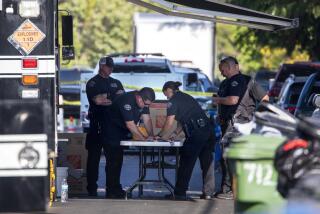FBI Agent Testifies in Hollywood Investigator’s Trial
- Share via
Celebrity private investigator Anthony Pellicano was surprisingly chatty while being transported in handcuffs from his Sunset Boulevard offices to a federal detention facility last November after his arrest on charges of illegally possessing two hand grenades and a quantity of C-4 plastic explosives, an FBI agent testified on the opening day of Pellicano’s federal trial Wednesday.
During the hourlong drive, said Special Agent Elizabeth Stevens, Pellicano disclosed that he had once thought of turning over the explosives and grenades to the bomb squad. He decided not to, she testified he told her, because he knew he would be asked how he came into possession of the items.
Pellicano, who has worked for some of the biggest names in entertainment, has never revealed the source of the alleged contraband.
Whether that question will be answered during his two-day trial before U.S. District Judge Dickran Tevrizian remains to be seen.
In cross-examining the FBI’s Stevens on Wednesday, defense attorney Victor Sherman suggested that Pellicano’s reticence might have been prompted by a private detective’s obligation to protect a client’s confidence.
The only hint of who that client might be has come from Assistant U.S. Atty. Daniel Saunders. In July, he filed a motion to prevent Pellicano from basing his defense on a claim that he had taken the grenades and explosives from “a former client (who died of a drug overdose in 1996) in order to prevent that client, whom defendant believed to be unstable, from causing harm to himself or others.” The defense never asserted any such claim, however.
Early in the case, defense co-counsel Donald Re said Pellicano had an explanation for how he had acquired the explosive devices, but Re has never elaborated.
Pellicano’s defense team contends that he placed the grenades and C-4 explosives in an office safe and simply forgot about them.
They were discovered when the FBI raided his office Nov. 21, looking for evidence that might link him to threats made against a Los Angeles Times reporter who was researching the relationship between actor Steven Seagal and an alleged Mafia associate. Pellicano has denied any involvement. So has Seagal.
One suspect has been arrested in that case and is awaiting trial in Los Angeles County Superior Court. He is Alexander Proctor, an ex-convict with a history of drug arrests. According to court documents, Proctor told an FBI informant that Pellicano had hired him to threaten the Times reporter, Anita Busch.
In their search of Pellicano’s offices, FBI agents also seized a huge quantity of computer files. Those files have now become the focus of a sweeping federal grand jury probe into allegations that Pellicano conducted illegal wiretapping on behalf of a number of Los Angeles attorneys.
Pellicano, who is free on $400,000 bond, closed his office this year, complaining that the notoriety had frightened away clients.
In an opening statement before Tevrizian on Wednesday, Assistant U.S. Atty. Kevin Lally contended that, by storing the explosives in his office safe, Pellicano inadvertently could have caused “death and destruction” to his employees and to the dozen or more FBI agents who stumbled upon them during their search.
David Freihon, the leader of the FBI search team, testified that he had ordered the agents to vacate Pellicano’s office after the explosives were discovered, but allowed them to wait in the adjoining hallway until the Los Angeles County Sheriff’s Department bomb squad arrived about two hours later. He said bomb detection units from the FBI and federal Bureau of Alcohol, Tobacco and Firearms had been too busy to respond.
Sherman seized upon that point to suggest that the prosecution had exaggerated the potential threat.
In his opening statement to the judge, Re contended that the government had also exaggerated the potency of the two grenades. He said they were nothing more than practice grenades containing about an ounce of low-grade gunpowder and should not be considered firearms under the law. In contrast, he said, a “weaponized grenade” packs about three ounces of high-grade explosives.
Pellicano is charged with possession of unregistered firearms and possession of plastic explosives that did not contain a detection agent, both felonies, as well as unlawfully storing explosive materials, a misdemeanor.
More to Read
Sign up for Essential California
The most important California stories and recommendations in your inbox every morning.
You may occasionally receive promotional content from the Los Angeles Times.













